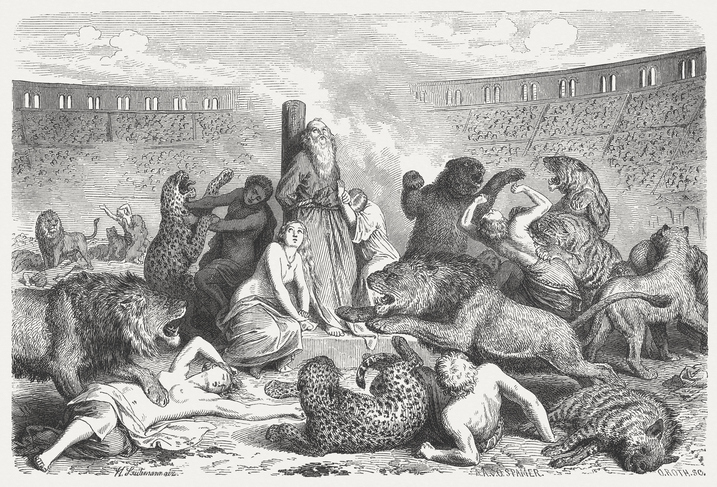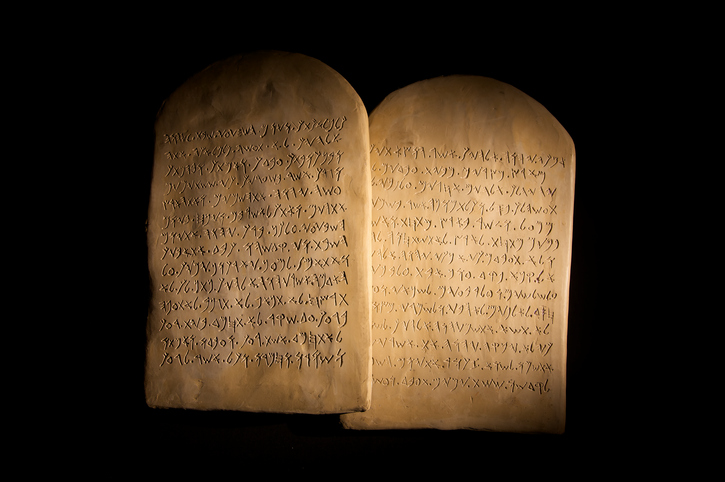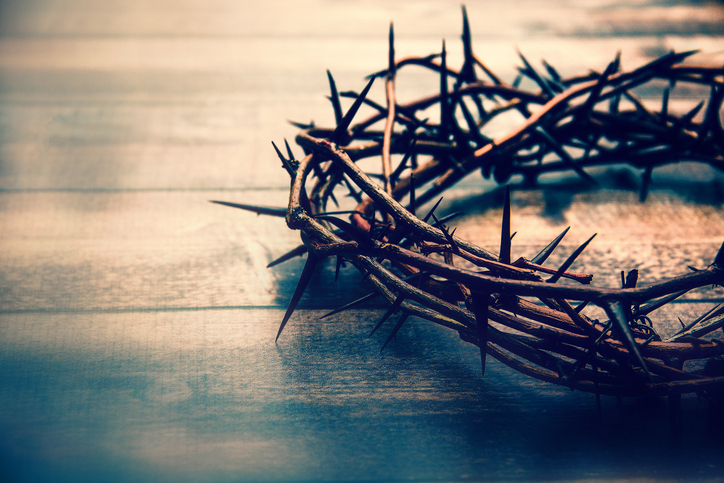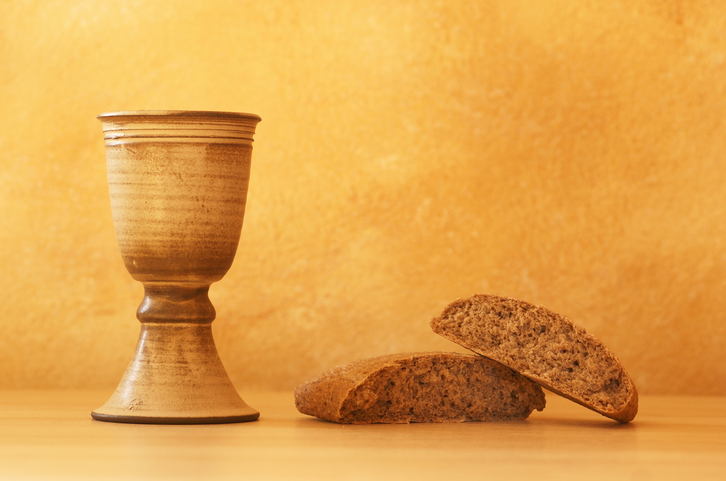This Gospel is so clear it might make us squirm. We understand what Jesus is saying, but how does it strike our hearts? What about that one person I just can’t get along with? Is Jesus really speaking about that one? Yes, he is! To live this Gospel, I need to be at peace with everyone. If I have hurt another person, I need to apologize and make amends. Still, human life is messy, and some relationships will never be restored. I can’t control the thoughts and actions of other people. Sometimes people take offense when none was intended or given, and refuse any relationship. In those painful cases, the reconciliation Jesus asks for has to take place in my own heart, that I bear no grudge and pray for that person.
Polycarp, the saint we celebrate today, offers us a wonderful example of reconciliation. The bishop of Smyrna in Asia Minor, he was martyred at the age of 86, around the year 155. We’re fortunate to have the Acts of his martyrdom, which gives us a wonderful glimpse of his personality. The government was persecuting Christians, and Polycarp thought it prudent to go into hiding. But one of his household servants betrayed him to the police, and led them to the bishop. When they all arrived at the house, instead of getting angry at the betrayal, Polycarp welcomed the servant and the police. “He ordered that something to eat and drink should be set before them, as much indeed as they wanted, while he asked them to allow him an hour to pray without disturbance.” He prayed for two hours, “remembering everyone who had at any time come in contact with him, both small and great, illustrious and obscure, as well as the whole Catholic Church throughout the world.” Then they led Polycarp off to be killed.
He was at peace and even showed his sense of humor. In the arena, Polycarp was told to swear an oath, saying, “Away with the atheists!”—meaning the Christians, who were called atheists because they refused to worship the Roman gods. Instead, looking up at the whole crowd of the lawless heathens then in the stadium, and waving his hand toward them, he said, “Away with the atheists!” After being urged again to denounce Christ, Polycarp declared, “I have served him for eighty-six years and he never did me any injury. How can I blaspheme my King and my Savior?” Then he went out to meet his death by fire and sword.
We can admire the way Polycarp graciously welcomed his enemies and served them, even when they came to drag him to his death. Polycarp offered his own life in union with the Eucharistic sacrifice, which he had often celebrated as a priest and bishop. At Mass, we too can offer the gift of our lives day by day, with a heart open to all. May this Lent help us to become more like Jesus, just as Polycarp gave himself for the Lord.
 Sr. Marianne Lorraine Trouve’ has been a member of the Daughters of Saint Paul since 1976. She has an MA in theology from the University of Dayton and has served on the editorial staff of Pauline Books and Media for over 20 years. She is the author of several books, including Saint Thomas Aquinas, and Mary: Help in Hard Times. When she’s not writing, editing, or working on logic puzzles, she can be found blogging at www.thomasfortoday.blogspot.com.
Sr. Marianne Lorraine Trouve’ has been a member of the Daughters of Saint Paul since 1976. She has an MA in theology from the University of Dayton and has served on the editorial staff of Pauline Books and Media for over 20 years. She is the author of several books, including Saint Thomas Aquinas, and Mary: Help in Hard Times. When she’s not writing, editing, or working on logic puzzles, she can be found blogging at www.thomasfortoday.blogspot.com.


 CatholicMom.com was started by Lisa Hendey in 2000 to create a community for Catholic parents to share insights on living their faith with their family. The website has grown substantially over the years to become a rich resource for all Catholics seeking spiritual enrichment for their families. It continues to provide fresh perspectives from the enriching columnists and contributors with daily articles and reflections as well as book and tech recommendations.
CatholicMom.com was started by Lisa Hendey in 2000 to create a community for Catholic parents to share insights on living their faith with their family. The website has grown substantially over the years to become a rich resource for all Catholics seeking spiritual enrichment for their families. It continues to provide fresh perspectives from the enriching columnists and contributors with daily articles and reflections as well as book and tech recommendations.

 As a Solutions Evangelist for Diocesan, Tommy is committed to showing parish and diocesan staffs how to use our communication tools to their best advantage. He has worked for years in various, youth ministry, adult ministry, and diocesan roles. As an expert on Catholic communication, Tommy uses his parish and diocesan experiences to help you make your ministry effective. To bring Tommy to your parish or for general inquiry, contact him at
As a Solutions Evangelist for Diocesan, Tommy is committed to showing parish and diocesan staffs how to use our communication tools to their best advantage. He has worked for years in various, youth ministry, adult ministry, and diocesan roles. As an expert on Catholic communication, Tommy uses his parish and diocesan experiences to help you make your ministry effective. To bring Tommy to your parish or for general inquiry, contact him at 
 Veronica Alvarado is a born and bred Texan currently living in Michigan. Since graduating from Texas A&M University, Veronica has been published in the Catholic Diocese of Austin’s official newspaper, Catholic Spirit, as well as other local publications. She now works as the Content Specialist in Diocesan’s Web Department.
Veronica Alvarado is a born and bred Texan currently living in Michigan. Since graduating from Texas A&M University, Veronica has been published in the Catholic Diocese of Austin’s official newspaper, Catholic Spirit, as well as other local publications. She now works as the Content Specialist in Diocesan’s Web Department.
 During the week, Matt is a mentor for individuals who have developmental and intellectual disabilities. On the weekends, he is a drummer for Full Armor Band.
During the week, Matt is a mentor for individuals who have developmental and intellectual disabilities. On the weekends, he is a drummer for Full Armor Band.

 Beth Price is a Secular Franciscan (OFS) and spiritual director who has worked in several parish ministry roles during the last 20 years. She is a proud mother of 3 adult children. Beth currently works at Diocesan.
Beth Price is a Secular Franciscan (OFS) and spiritual director who has worked in several parish ministry roles during the last 20 years. She is a proud mother of 3 adult children. Beth currently works at Diocesan.
 Paul Fahey is a husband, father, and a parish director of religious education. He is a student of Theology, History, and Catholic Studies. If you like what he has to say, check out his blog,
Paul Fahey is a husband, father, and a parish director of religious education. He is a student of Theology, History, and Catholic Studies. If you like what he has to say, check out his blog, 
 Tami Urcia spent early young adulthood as a missionary in Mexico, while simultaneously studying Theology and Philosophy in Spanish. She has worked in Family Life Ministry at both the diocesan and parish levels. She currently works for Diocesan, is a freelance translator and blogger. She and her Peruvian husband are raising their children bilingual and love sharing reflections of life, love and everything in between. Find out more about her here:
Tami Urcia spent early young adulthood as a missionary in Mexico, while simultaneously studying Theology and Philosophy in Spanish. She has worked in Family Life Ministry at both the diocesan and parish levels. She currently works for Diocesan, is a freelance translator and blogger. She and her Peruvian husband are raising their children bilingual and love sharing reflections of life, love and everything in between. Find out more about her here: